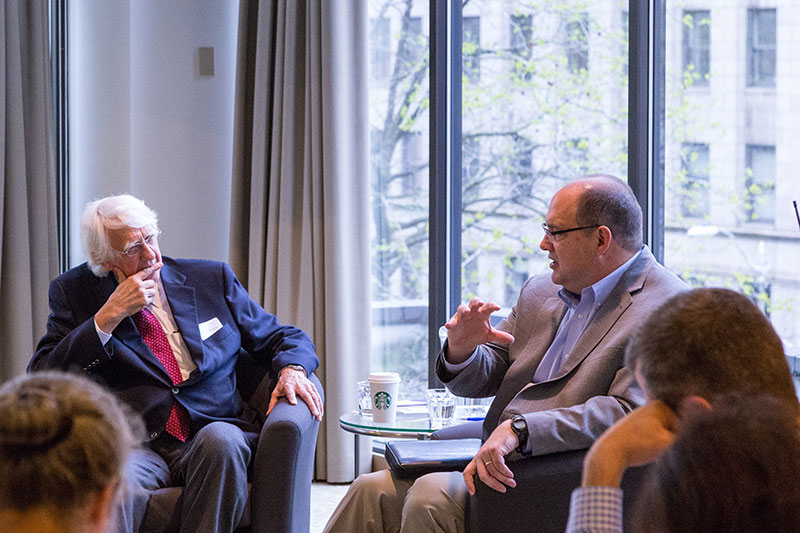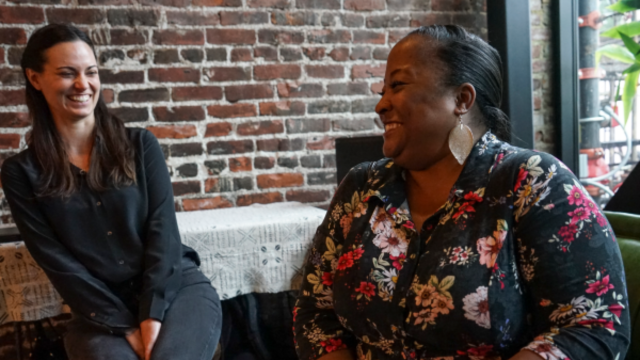Jon Stahl, Communications Director
On March 25, Philanthropy Northwest and Seattle CityClub co-hosted an event titled "Stepping Up Our Game: How Can Philanthropy Strengthen Democracy?" featuring Daniel Kemmis, Philanthropy Northwest board member and fellow at the Kettering Foundation and Daniel Stid, director of the Hewlett Foundation's Madison Initiative. Facilitated by Mark Sedway from The Giving Practice, "the Daniels" led us through an engaging collaborative conversation about the health of our democracy and the many opportunities for philanthropists to get involved in strengthening it.

Daniel Kemmis and Daniel Stid
Daniel Kemmis spoke of his experiences as mayor of Missoula, Mont. in the early '90s, and outlined some of the themes he explored in detail in his 2014 monograph, Philanthropy and the Renewal of Democracy. " Two of his key "aha moments" were:
- Much of the civic innovation in Missoula flowed directly from the initiative and effort of engaged citizens — rather than from brilliant ideas conceived of by the mayor, or by city government in general.
- Many of those efforts were spearheaded or supported by nonprofits — and thus, almost by definition, supported by philanthropy. "I realized," Kemmis said, "that in funding many of our nonprofits, philanthropy was in effect unintentionally supporting the health of our democratic institutions." But, he continued, the challenges our democratic institutions now face have become so severe that they now require active, intentional philanthropic investment, rather than as the "unintended consequences" of more instrumental investments.
Daniel Stid described one such intentional philanthropic investment: the Hewlett Foundation's Madison Initiative, a three-year, $50 million investment in democratic reform, mostly at the federal level. It's goal: to create the conditions in which Congress can deliberate, negotiate and compromise in ways that work for most Americans — not to obtain specific policy outcomes.
Some key points from Stid:
- What has changed over the past 30 years is that our federal institutions have lost the ability to negotiate and compromise. This has been driven by a dramatic rise in ideological purity within each party, in the context of a federal system of checks and balances that is simply ill-equipped to function with highly ideologically-disciplined parties that are nearly equal in their power.
- In 2012, U.S. foundations invested a total of about $811 million in democracy reform issues.
- Hewlett is focusing on the federal level, but there is just as much (if not more!) opportunity at the state and local level. Hewlett is pursuing three key interconnected strands of opportunity: 1) Improving the culture of Congress itself; 2) Campaign finance and election reform; 3) Citizen engagement and information. He also shared a larger "system map" Hewlett created, which continues to evolve.
- There are many ways for philanthropy to support democracy, at the federal, state and local levels, including:
- Civic information (e.g. nonprofit journalism, transparency)
- Civic participation (organizing, GOTV)
- Electoral rules (redistricting, open primaries, ranked choice voting)
- Money in politics/policy (campaign finance + lobbying reform)
- Bipartisan problem solving
- Government performance
- We can't go back to a 1970's-era campaign finance regime, but we can build a "democracy lobby" for positive changes.
Our thanks to the many Philanthropy Northwest and Seattle CityClub members who were able to join us for this important — and ongoing — conversation, and to Seattle CityClub for hosting us!



Comments
Thanks to Jon Stahl for this
Thanks to Jon Stahl for this excellent summary of the April 25 session on restoring democracy. Thanks to City Club for hosting the event, to Daniel Stid for sharing his very substantial experience and insights, to Mark Sedway for an outstanding job of facilitation, and to Don Andre and Kathleen Pierce for working with Daniel, Mark and me to shape the convening. Most of all, I want to thank all the people who devoted a morning to helping us think about what each of us and our organizations can do to strengthen the crucial practice of democracy.
I was especially struck by the combination of 1) deep concern over the health of many of our democratic institutions and 2) hopefulness that we can do something about it. Both the concern and the hopefulness seem to me to lie at the heart of democracy itself, since genuine self-government is hardly imaginable without both.
The session organizers are hard at work gleaning lessons from the notes we took, and we will be asking both those who attended and those who couldn’t be there to offer suggestions about concrete steps (large or small) that any of us can take to strengthen democracy. For now, I just want to offer my own suggestion, inspired by the energetic engagement around the table at City Club that morning. From what I saw and heard there, it seems clear to me that almost any philanthropic or nonprofit organization could benefit from devoting a couple of hours of in-house discussion with board, staff or both to:
1) asking how people feel (and what they think) about the health of our democracy;
2) reminding themselves of the various ways in which they already practice and promote democracy, either as individuals or as an organization;
3) asking whether the organization is positioned or inclined to do more of this, or to do it more intensively or more intentionally, or in some other way to contribute to the revitalization of democracy.
Any one organization having this conversation won’t save American democracy, I suppose. But if our body politic is out of shape, getting it healthy again is going to depend on many small strengthening acts. This is one simple one, and we learned at City Club how enlivening it can be.
Daniel Kemmis
Board member, Philanthropy Northwest